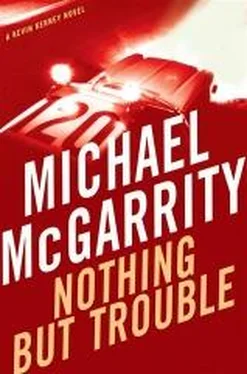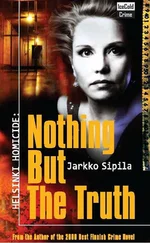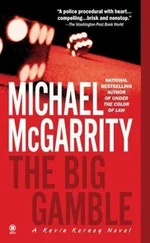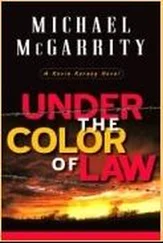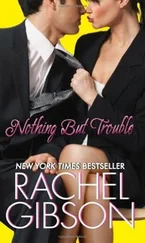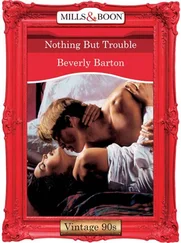Michael McGarrity - Nothing But Trouble
Здесь есть возможность читать онлайн «Michael McGarrity - Nothing But Trouble» весь текст электронной книги совершенно бесплатно (целиком полную версию без сокращений). В некоторых случаях можно слушать аудио, скачать через торрент в формате fb2 и присутствует краткое содержание. Жанр: Триллер, на английском языке. Описание произведения, (предисловие) а так же отзывы посетителей доступны на портале библиотеки ЛибКат.
- Название:Nothing But Trouble
- Автор:
- Жанр:
- Год:неизвестен
- ISBN:нет данных
- Рейтинг книги:4 / 5. Голосов: 1
-
Избранное:Добавить в избранное
- Отзывы:
-
Ваша оценка:
- 80
- 1
- 2
- 3
- 4
- 5
Nothing But Trouble: краткое содержание, описание и аннотация
Предлагаем к чтению аннотацию, описание, краткое содержание или предисловие (зависит от того, что написал сам автор книги «Nothing But Trouble»). Если вы не нашли необходимую информацию о книге — напишите в комментариях, мы постараемся отыскать её.
Nothing But Trouble — читать онлайн бесплатно полную книгу (весь текст) целиком
Ниже представлен текст книги, разбитый по страницам. Система сохранения места последней прочитанной страницы, позволяет с удобством читать онлайн бесплатно книгу «Nothing But Trouble», без необходимости каждый раз заново искать на чём Вы остановились. Поставьте закладку, и сможете в любой момент перейти на страницу, на которой закончили чтение.
Интервал:
Закладка:
“Is that going to happen anytime soon?” Kerney asked.
Dobson shrugged. “That depends. We’ve got some groundwater contamination issues to deal with, along with some other environmental cleanup problems. The lawyers are fighting it out with the federal and state regulators.”
“Do you live in Playas?” Kerney asked.
“I sure do. Me and about fifty-some other folks, give or take a few. The deal is that when the town got sold to become an antiterrorism training center, the residents could stay. Some have been hired on as maintenance and upkeep personnel.”
“Mind if I take a look around the smelter?” Kerney asked.
“Go ahead,” Dobson said. “But keep out of those areas posted for employees only. That’s most of the plant. But you can walk or drive around the perimeter, if the gates are unlocked. Watch out for rattlesnakes.”
He opened a counter drawer and handed Kerney a packet of general information about the smelter. “There’s some interesting stuff in there about the valley and the company.”
Kerney thanked Dobson for his time and went outside. High above him the warning beacon on top of the smokestack flashed brightly in the afternoon sunlight. At nightfall, if Officer Flavio Sapian was right, the Star of the North would guide another group of illegal immigrants across the border. Kerney wondered how many Border Patrol officers were on station, ready to pounce on the coyotes who’d be hauling illegal human cargo into the States. The Border Patrol was stretched tight from lack of funding, and the increase promised after 9/11 had never fully materialized.
Behind the administration building, at the end of a large, virtually empty parking lot, was the main employee entrance to the smelter, festooned with fading painted signs that promoted safety and noted 698 consecutive accident-free days at the plant. Parked near the entrance were several vehicles, including a panel van that looked like the one that had passed Kerney earlier in the day just before he found the dying Mexican lying on the pavement.
He couldn’t be sure if it was the same vehicle, but it was a close enough match to make Kerney pull out Flavio Sapian’s business card and call him on his cell phone.
“Have you been able to ID the victim?” Kerney asked, when Sapian answered.
“Negative, Chief. He had no papers on him at all. The body’s en route to Albuquerque for an autopsy. Maybe his prints will ID him, but I doubt it.”
“I’m down at the copper smelter south of Playas, looking at a vehicle that’s similar to the one that passed me on the highway,” Kerney said. “Same color, same make. You want the license plate number?”
“You bet I do. Read it off.”
Kerney gave him the info and said, “Let me know if anything comes of it.”
“Ten-four.”
Sapian disconnected and Kerney continued his walk. He didn’t know the first thing about copper smelting, but the handout Dobson had provided told him a lot. The flash furnace Dobson had mentioned once produced eight hundred tons of cast copper daily. In its heyday the smelter had operated around the clock, processing two thousand tons of copper concentrate every twenty-four hours.
Kerney eyed the buildings, many of them two or three stories tall. Several were connected by what looked like covered chutes or conveyers. To the north the rail spur ran to what appeared to be a loading dock abutting a storage silo. To the south a series of large steel storage tanks defined an area that Kerney took to be the place where sulfuric acid had been produced. Near the tall smokestack in the center of the complex stood another silo and the largest structure on the grounds, which Kerney figured held the furnace used to mold the copper castings.
He could see why Malcolm Usher, the director of the film, would want to use the smelter in the movie. The stark, utilitarian industrial complex rose out of the desert on a grand scale, in sharp contrast to the raw, knuckled mountains, the soapweed yucca flats, and the ruddy white soil of the dry lakebed, creating a visually stunning effect.
Back at the employee entrance the panel truck was gone and the administration building was locked. Near his truck a young diamondback rattlesnake slithered slowly across the pavement, soaking up the heat of the day, and disappeared under a boulder in a landscaped bed of crushed red rock that fronted the entrance to the building.
In late summer or early fall female diamondbacks laid their eggs, giving birth to upwards of two dozen young. As a precaution Kerney checked around his truck carefully before climbing on board and driving away.
Over twenty years ago Malcolm Usher had started his career directing country music videos, gradually working his way up the food chain. After a successful stint directing episodes for a number of sitcoms, he’d moved on to made-for-television movies, one of which had been nominated for an Emmy.
Usher had hoped the Emmy nomination would vault him into a shot at directing a feature film, and after waiting for two years he’d finally gotten the call. With this new movie Usher could advance his career. But after reading the script he’d realized the story line was just a little shy of the necessary ingredients for a successful feature film. He was determined to make it better.
In his apartment he sat at the dining table and looked at the digital photographs his cinematographer had taken of the smelter. The best location for the new scenes was next to the delivery dock by the rail spur, where ore cars and some heavy equipment were parked at the siding. From that vantage point the smelter and smokestack would form a perfect backdrop against the mountains.
Besides offering excellent visuals, the site provided easy access, which minimized the logistics of moving the equipment, livestock, and cast and crew to the location.
He thought about Alfred Hitchcock’s famous crack that actors should be treated like cattle, and snickered. Hitchcock had never made a Western, or he would have had his chance.
Pleased with his decision, Usher began mapping out the scenes. He was deeply engrossed in the process when Johnny Jordan knocked at the open door and entered, looking piqued.
“I don’t like this change you’re proposing, Malcolm,” he said.
Usher glanced at his wristwatch. “You took your time getting here.”
Johnny turned a chair around and straddled it. “And I’ve been talking to some people who don’t like it either.”
“Let me guess,” Usher said. “Could that be your rodeo stars?”
Johnny nodded. “They hired on to do a cattle drive and a rodeo, not to be part of some dumb melee at the damn copper smelter.”
Usher removed his reading glasses. “No, they signed on as actors, which means they do what the director tells them to do. If they don’t like it, I’ve got stuntmen who can do the job just as well for a lot less money. In fact, Corry McKowen, my stunt coordinator, rode the pro circuit for five years. I’m sure he wouldn’t mind getting a costarring credit on his resume.”
“Corry was a lightweight on the circuit.”
“Maybe so, but he’s no lightweight as a stuntman. Tell me now if you want to pull your cowboys off the film. Believe me, it’s no big deal to replace actors who walk before shooting starts.”
“I didn’t say that,” Johnny said, his brow creased with worry.
Usher held back a smile. Jordan might know a lot about rodeoing, but he didn’t know squat about moviemaking. “Then work with me, Johnny. This could be the best damn Western fight scene in a film since John Wayne and Maureen O’Hara brawled with the homesteaders in McLintock! over forty years ago.”
“That was a good movie,” Johnny said grudgingly.
“Let’s write the scenes together so that your boys get to show off their stuff in front of the cameras,” Usher said.
Читать дальшеИнтервал:
Закладка:
Похожие книги на «Nothing But Trouble»
Представляем Вашему вниманию похожие книги на «Nothing But Trouble» списком для выбора. Мы отобрали схожую по названию и смыслу литературу в надежде предоставить читателям больше вариантов отыскать новые, интересные, ещё непрочитанные произведения.
Обсуждение, отзывы о книге «Nothing But Trouble» и просто собственные мнения читателей. Оставьте ваши комментарии, напишите, что Вы думаете о произведении, его смысле или главных героях. Укажите что конкретно понравилось, а что нет, и почему Вы так считаете.
